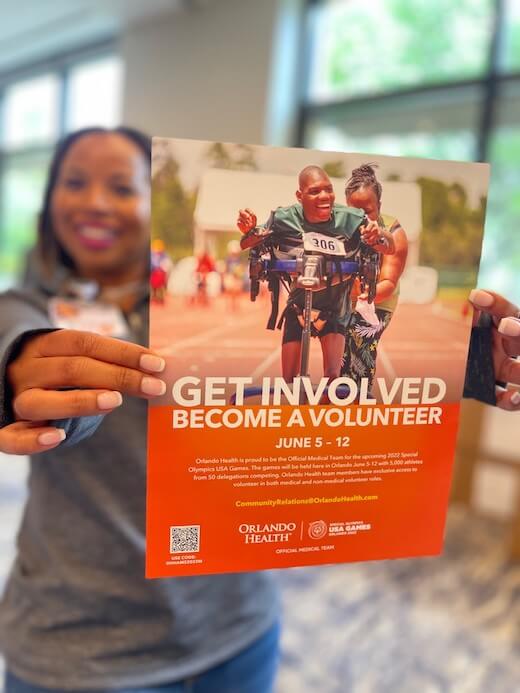Orlando Health Providing Care at 2022 Special Olympics USA Games
By Alan Schmadtke, Editorial Contributor

Orlando Health is delivering care to more than 4,000 athletes and 1,500 coaches plus 10,000 volunteers and an expected 125,000 fans at the 2022 Special Olympics USA Games.
Orlando Health serves as the Games’ official medical team, a role that required more than a year of planning and training for doctors, nurses, technicians and other medical professionals.
“It is a massive undertaking — the biggest Special Olympics in history. We’re basically in charge of anything related to healthcare, and it even goes a little bit beyond that,” says Dr. Michael Jablonski, a board-certified orthopedic surgeon with Orlando Health Jewett Orthopedic Institute.
Dr. Jablonski regularly provides care to professional and collegiate athletes in the area. This week he’s serving as the chief medical officer for the event on June 5-12 held at multiple venues in Central Florida.
Orlando Health’s medical team, led by Dr. Jablonski and Cary D’Ortona, president of Orlando Health Arnold Palmer Hospital for Children, is working hand in hand with the 2022 Special Olympics USA Games.
“We wanted to partner with the Special Olympics and the Games because we are about inclusion,” D’Ortona says.
Specialized Care
Dr. Jablonski is determined to give athletes and their delegations the most sweeping medical coverage Special Olympians have ever experienced.
Orlando Health has more than 200 clinicians and 40 leaders overseeing the medical services and another 800 team members have signed up for more than 1,000 shifts as volunteers.
As athletes arrive in Orlando, they will have access to health providers both at competition venues and their hotel. Medical personnel are available to them 24/7 until the Games conclude.
“There are some amazing stories of things that are caught during these exams that literally save lives,” says Dr. Jablonski. “Unfortunately, athletes with intellectual disabilities sometimes don’t get access to medical care like people who are abled.”
Orlando Health’s commitment to put providers in area hotels for overnight coverage is a first for the Special Olympics, Dr. Jablonski says.
Before and during the Games, athletes have access to a comprehensive physical exam, dubbed Healthy Athletes. It has several major components:
- Fit Feet (podiatry)
- Fun Fitness (range of motion, strength)
- Strong Minds (emotional health)
- Health Promotion (prevention and nutrition)
- Special Smiles (dentistry)
- Healthy Hearing
- Opening Eyes
Medical volunteers, who went through special training, have reviewed medical histories of thousands of athletes to identify potential issues to watch for. Often because of the medications they take, athletes with intellectual disabilities are more prone to heat-related illnesses and seizures.
“Sometimes in this population, even without a concussion they might have trouble with balance or memory. We’ve been having a lot of talks about how to diagnose concussions in Special Olympics athletes,” Dr. Jablonski says.
Sometimes in this population, even without a concussion they might have trouble with balance or memory. We’ve been having a lot of talks about how to diagnose concussions in Special Olympics athletes. – Dr. Jablonski
Partnership Benefits
After the medals are awarded and athletes return home, Dr. Jablonski will submit a comprehensive report to Special Olympics USA. It will serve as a protocol and process road map for hosts of the next Games in 2026 in Minnesota.
Benefits of the partnership between Orlando Health and the Special Olympics will extend beyond the coming week to help the local community, too. Orlando Health team members can take back to their regular duties a deeper understanding of some of their patients. Orlando Health also continues as a partner and medical provider to Special Olympics Florida.
“In medical school, we don’t get a lot of training to treat people with intellectual disabilities,” Dr. Jablonski says. “And so for physicians, nurses, physical therapists, podiatrists and athletic trainers, this is a way to allow our providers to become more inclusive by understanding first-hand what patients and athletes with intellectual disabilities need most. And really teach them as well. Let them know what it’s like to provide care for people with intellectual disabilities.”

